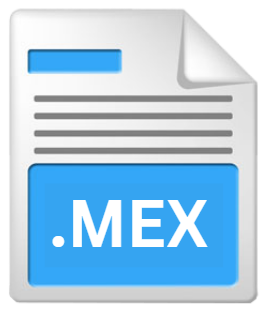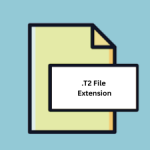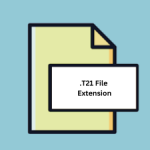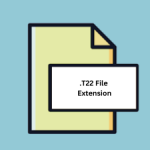.MEX File Extension

Macro Express File
| Developer | Insight Software Solutions |
| Popularity | |
| Category | Data Files |
| Format | .MEX |
| Cross Platform | Update Soon |
What is an MEX file?
The .MEX file extension is primarily associated with MATLAB, a high-level programming language and environment used for numerical computing and data analysis.
MATLAB, short for “MATrix LABoratory,” is a popular tool among engineers, scientists, and researchers for its capabilities in data analysis, visualization, and algorithm development.
.MEX files, in the context of MATLAB, are custom binary files that contain compiled functions or algorithms written in C, C++, or Fortran. These files are used to extend the functionality of MATLAB, allowing users to incorporate external code into their MATLAB projects.
In essence, .MEX files act as bridges between the MATLAB environment and lower-level programming languages, enabling users to harness the power of both worlds.
More Information.
The history of .MEX files is closely tied to the evolution of MATLAB. As MATLAB gained popularity in various scientific and engineering disciplines, the need for custom extensions and performance optimization became apparent. .MEX files were introduced to address this need.
The initial purpose of .MEX files was to allow MATLAB users to write and compile their functions in lower-level languages like C, C++, or Fortran and then integrate them into their MATLAB projects.
This provided a significant performance boost for computationally intensive tasks, as the compiled code could execute much faster than interpreted MATLAB code.
Origin Of This File.
The origin of .MEX files can be traced back to the development of MATLAB itself. MATLAB was created by Cleve Moler in the late 1970s and was initially designed to provide easy access to the LINPACK and EISPACK libraries, which were written in Fortran.
To achieve this, MATLAB needed a way to incorporate Fortran code seamlessly, leading to the creation of .MEX files.
File Structure Technical Specification.
.MEX files have a specific structure and technical specification that makes them compatible with MATLAB. They are binary files that contain machine code compiled from C, C++, or Fortran source code.
The structure of a .MEX file typically includes:
- Header Information: This section contains metadata about the .MEX file, such as the version of MATLAB it was compiled with and information about the functions it contains.
- Compiled Code: The core of the .MEX file consists of the compiled code, which is written in a lower-level programming language. This code is optimized for speed and efficiency.
- Function Entry Points: .MEX files provide entry points for the functions they contain. These entry points allow MATLAB to call and execute the functions defined in the .MEX file.
- Error Handling: .MEX files include error handling mechanisms to ensure graceful handling of errors and exceptions during execution.
How to Convert the File?
Converting a file into the .MEX format involves a multi-step process that includes writing code in a lower-level language (typically C or C++), compiling it into a shared library, and then linking it with MATLAB.
Here’s a simplified overview of the steps involved:
- Write Code: Create the desired functionality in C or C++ code. This code will be compiled into the .MEX file.
- Compile Code: Use a compatible compiler to compile the code into a shared library, typically in the form of a dynamic link library (DLL) or a shared object (SO) file, depending on the platform.
- Create .MEX File: In MATLAB, use the
mexcommand to create the .MEX file from the compiled shared library. This step involves specifying compiler options and flags. - Link with MATLAB: Incorporate the .MEX file into your MATLAB scripts or functions by calling it as you would any other MATLAB function.
The exact process can be more involved depending on the complexity of the code and the platform used, but these are the fundamental steps for converting a file into the .MEX format.
Advantages And Disadvantages.
Advantages:
- Performance Boost: One of the primary advantages of .MEX files are the significant performance boost they offer. Compiled code runs much faster than interpreted code, making complex calculations and simulations more efficient.
- Integration with MATLAB: .MEX files seamlessly integrate with MATLAB, allowing users to combine the high-level capabilities of MATLAB with the speed of lower-level languages.
- Access to External Libraries: MATLAB users can leverage external libraries and existing code by compiling them into .MEX files, expanding the range of available functions.
Disadvantages:
- Complexity: Writing and debugging code in C, C++, or Fortran can be more challenging than using MATLAB’s built-in functions. This complexity may deter some users.
- Platform Dependency: .MEX files are platform-specific, which means that a .MEX file compiled for one operating system may not work on another without recompilation.
- Limited Portability: Sharing .MEX files with others who do not have access to the source code and compilation tools can be problematic.
How to Open MEX?
Open In Windows
- Install MATLAB on your Windows machine.
- Open the MATLAB environment.
- You can call and use .MEX files directly within your MATLAB scripts or functions.
Open In Linux
- Install MATLAB on your Linux system.
- Open a terminal and start MATLAB by entering the command
matlab. - You can use .MEX files within the MATLAB environment as on Windows.
Open In MAC
- Install MATLAB on your Mac computer.
- Launch MATLAB from the Applications folder.
- Use .MEX files in your MATLAB scripts or functions.
Open In Android
MATLAB is not typically available as a native app on Android devices. You can access MATLAB through the MATLAB Mobile app, which provides limited functionality and does not support .MEX files. Full support for .MEX files are available on desktop systems.
Open In IOS
MATLAB is not available as a native app on iOS devices. Similar to Android, you can use the MATLAB Mobile app for limited functionality, but .MEX files are not supported.













